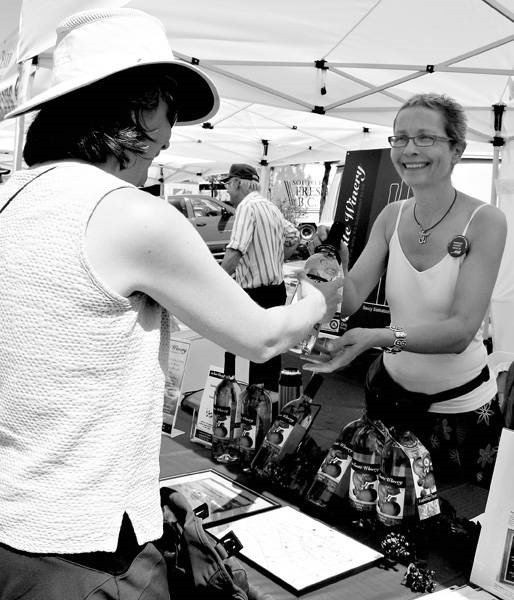Even before shoppers arrived at opening day of St. Albert’s downtown farmers’ market, they could hear the bellowing Scottish bagpipes of a slightly harried busker.
It was 28 C last Saturday and crowds were so thick at one point, pedestrian traffic along St. Thomas Street and St. Anne Street crawled to a turtle’s pace.
But vendors and shoppers alike were smiling. Locals seemed to be saying, “We’re tired of bad weather. Let’s have fun.”
One vendor that barely had time to eat was Tonia Chrapko, of enSanté Wineries. Located about 160 kilometres east of St. Albert in Brosseau, enSanté is the first and only certified organic fruit winery in Alberta.
In a groundbreaking move this year, the provincial government has for the first time allowed wineries to sell their vintages at farmers’ markets.
“We’re really excited. It’s our target market. People who are interested in local organics, this is where they come,” says Chrapko.
Garlanded by grape leaves, her crisp, white booth was a magnet for visitors. She displayed five of the eight certified organic wines produced by her family: apple, wild cherry, raspberry, rhubarb and honey mead.
Organic fruit wines are different from grape wines, and Chrapko spent a large part of her day educating people and fielding questions about fermentation, sweetness, alcohol content and wine pairings.
With an alcohol content that ranges from 11.5 to 13.5 per cent, the lively, light, refreshing drinks provoked a series of discussions, sometimes laced with a vintner’s special brand of humour. The booth also sells organic wine jelly. “I’ll bet you never thought you could have an organic breakfast hangover, “ Chrapko jokes.
“I’m starting to like you already,” quips a boomer before scooping up a bottle as a wine tasting experiment.
Chrapko’s low-key humour masks a tenacity that reaches back to her Ukrainian roots. For decades the Chrapkos have operated a farm, first a 600-hectare spread raising pigs and grain before converting it to organics.
When Elizabeth, Chrapko’s mother, planted an organic apple orchard in partnership with the University of Saskatchewan, her father Victor decided to start a winemaking hobby. “There were only so many pies you could make.”
But in 2001, Alberta’s agriculture industry was starting to show real fatigue. Victor Chrapko approached the provincial government to pass legislation allowing the sale of locally produced fruit wine.
“He was an innovator, a forward thinker. He saw another opportunity to create another industry. He saw it as sustainability, diversification and value added in agriculture.”
It wasn’t until 2005 that the government permitted Chrapko to sell his wine to liquor stores and at the farm gate. Finally in December 2008, the Chrapkos were given the go-ahead to sell at farmers’ markets.
Once the fruit is picked, it is placed in large 700- to 1,500-litre vats. Organic sugar and yeast is added and the vintners wait until the alcohol level reaches the right point. During the process, the wines are racked (transferred to another vat) several times leaving sediment on the bottom.
“Once it’s bottled, you can drink it right away,” says Chrapko whose particular favourite is a rhubarb/saskatoon blend.
Wine sampling is not permitted at the market. However, the winery hosts wine tasting sessions by appointment. Call 780-657-2275 or visit www.enSanteWinery.com.




